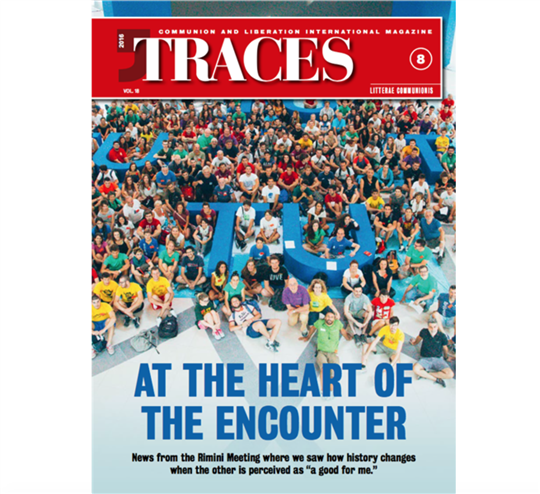
Traces N.8, September 2016
A Human SympathySeptember has come, and almost without realizing it, we come to a fork in the road. We get back to normal life as we return to work, school, and university. Everyday life starts again. If vacations are “the time of freedom,” as Fr. Giussani reminded us, the moment when, having fewer obligations, we choose how to use our hours, and thus see better what is most important to us, then the return in autumn is a test in its own way, a very revealing one. We can find ourselves already at the mercy of the waves, weary at the idea of facing the routine (the usual colleagues, the same old relationships, the inexorable responsibilities… the “living that knocks your legs out from under you” described by Pavese) or even saddened and burdened when we raise our eyes to the bigger and more anguishing situations all around us. Or, it may happen that we find ourselves alive, really wanting to return to that same routine, curious to see what will happen. Happy, in other words, lit up with hope. It is a subtle, almost imperceptible fork in the road, but a real one. It does not depend on what we say or do: it is an attitude from deep down inside, something that we see emerge in the way we face reality, beyond our words or intentions. We stand in front of daily life in the same position from which we face the larger problems: closed or open, folded in upon ourselves or thrown wide open to the new. What makes the difference?
On the Traces website you will find a reflection by Fr. Julián Carrón, the head of CL, in which he synthesizes the four days of meetings and dialogues with the leaders of the Movement from throughout the world. We offer it to everyone as an instrument for serious reflection. At a certain point, repeating a sentence said by one of the participants (“the certainty of being loved allows me to embrace reality”), he quotes Fr. Giussani: “The sign of certainty is that one has sympathy with everything that he encounters. In fact, sympathy with all that you encounter is only given by the presence in us of the certainty of our destiny.” A certainty. In the midst of the great insecurity in which we live, the seasickness that seizes us at the idea of having to live daily life in an increasingly difficult context, the thing that restores our gusto and our desire to come to grips with “all that you encounter”–the thing that frees us–is certainty. Not certainty in our own means, projects, abilities, and plans (in the “strength of our tools,” Pope Francis observes in his very beautiful message to the Meeting of Rimini, which you will also find in this issue): we see all too well how inadequate they are for bearing the shock of the impact with things. This certainty instead is “certainty of our destiny,” a continual and ever-deeper rediscovery of what we are: “loved.” This is what enables us to embrace reality.
In this issue of Traces you will find many signs of this dynamic, from the summary of the Meeting of Rimini, where “human sympathy” (“the willingness to put ourselves in the shoes of the others to dig below the surface and grasp what troubles their heart” as the Pope said to the organizers) was evident, to the powerful
story of those whose lives have been turned upside down by Mother Teresa of Calcutta. All of these are echoes of what happens when, as the Pope asks, the heart of life becomes “the strong and simple presence of Jesus, His consoling and encouraging mercy,” and nothing else, the echo of what happens a little bit at a time, over the course of years, as we become more certain of Him and of the fact that we are loved. Deep down, this is the purpose of time, even the time that is now starting anew: to become certain of being loved.